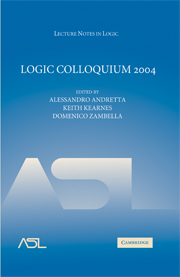Book contents
- Frontmatter
- Contents
- Introduction
- Speakers and Titles
- Abstract elementary classes: some answers, more questions
- On the density of Hausdorff ultrafilters
- Zero-groups and maximal tori
- Constructive set theory with operations
- Parametrized local zeta functions
- Colourings of hypergraphs, permutation groups and CSP's
- Tolerance intersection properties and subalgebras of squares
- Universes in type theory part I—Inaccessibles and Mahlo
- Hausdorff-dimension and weak truth-table reducibility
- Computation and the explanation of intelligent behaviours: ethologically motivated restart
- Constructible sheaves and definability
- An overview of modern universal algebra
- Lecture Notes in Logic
Universes in type theory part I—Inaccessibles and Mahlo
Published online by Cambridge University Press: 05 July 2014
- Frontmatter
- Contents
- Introduction
- Speakers and Titles
- Abstract elementary classes: some answers, more questions
- On the density of Hausdorff ultrafilters
- Zero-groups and maximal tori
- Constructive set theory with operations
- Parametrized local zeta functions
- Colourings of hypergraphs, permutation groups and CSP's
- Tolerance intersection properties and subalgebras of squares
- Universes in type theory part I—Inaccessibles and Mahlo
- Hausdorff-dimension and weak truth-table reducibility
- Computation and the explanation of intelligent behaviours: ethologically motivated restart
- Constructible sheaves and definability
- An overview of modern universal algebra
- Lecture Notes in Logic
Summary
Abstract. We give an overview over universes in Martin-Löf type theory and consider the following universe constructions: a simple universe, E. Palmgren's super-universe and the Mahlo universe. We then introduce models for these theories in extensions of Kripke-Platek set theory having the same proof theoretic strength. The extensions of Kripke-Platek set theory used formalise the existence of a recursively inaccessible ordinal, a recursively hyper-inaccessible ordinal, and a recursively Mahlo ordinal. Using these models we determine upper bounds for the proof theoretic strength of the theories in questions. In case of simple universes and the Mahlo universe, these bounds have been shown by the author to be sharp. This article is an overview of the main techniques in developing these models. Full details will be presented in a series of future articles.
Introduction. This article presents some results of a research program with the goal of formulating extensions of Martin-Löf type theory (MLTT) that are proof-theoretically as strong as possible while remaining predicatively justified, and of determining their precise proof theoretic strength. We see three main reasons for following this research program:
1. The goal is to develop type theoretic analogues of the theories analysed in proof theory. In this way we hope to make the rather abstract and technically difficult results from proof theory more accessible to the general audience, and we hope as well to give some computational meaning to those results. This will be particularly important in case of the Π3-reflecting universe (to be presented in the follow-up article [37]), which was developed from Rathjen's ordinal notation system [26] for KP + (Π3− refl) (Kripke-Platek set theory extended by the principle of Π3-reflection).
- Type
- Chapter
- Information
- Logic Colloquium 2004 , pp. 123 - 156Publisher: Cambridge University PressPrint publication year: 2007
- 2
- Cited by



